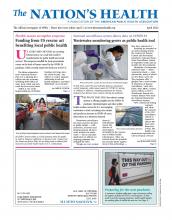
For more tips on building your resilience, visit www.apa.org
Let’s be honest: Life isn’t easy. There will always be bumps as you ride the hardships that come with being human.
Problems — both large and small — will come and go. The good news is humans are wired to bounce back from stressful or traumatic situations, and you can strengthen that skill. In other words, you can learn to be resilient. Resilience is important because it gives you the strength you need to overcome the difficulties that come your way.
Resilience is defined as the process of successfully adapting to difficult or challenging experiences. You might see yourself in this definition, especially if you’ve weathered a health crisis, financial difficulties, relationship struggles or the loss of a loved one. A resilient person will bounce back from hard times and maybe even become stronger.
“Every human being is resilient,” says resiliency coach Eva Selhub, MD, a former Harvard University instructor and founder of Resiliency Experts LLC. “We are wired to live in a wilderness where the conditions would be harsh. Just getting through the womb is a hardship, but we are designed to be able to keep going.”
Make no mistake: Resilient people experience hard times and tragedies, but they have a growth attitude, a “whatever doesn’t kill me makes me stronger” attitude, she says. You can cultivate that attitude too.
Connecting the dots
While some people can easily move on after a setback, others might feel helpless and turn to unhealthy coping mechanisms such as avoidance, isolation or substance use. Life experiences, environmental factors and genetics can all play a role in your ability to bounce back, research shows.
“All of us experience adversity,” says Ann Masten, PhD, a resilience researcher and University of Minnesota professor. “Day-to-day life has little threats and big threats. We all learn from experience.”
Building your resilience is a bit like building your immune system, says Masten, who has been conducting research on the topic of resilience for decades. Just as we need to expose ourselves to some germs to build a strong immune system, we also must experience adversity to build our resilience. That process starts in early childhood.
“Parents are well aware that it’s important to let kids learn to handle some things on their own,” Masten says. “We scaffold children so that they gain experience with the normal bumps of life and learn that when you fall down you can get up again.”
Over the years, resilience researchers have discovered a number of protective factors that can optimize our resilience. In fact, many of the healthy habits we strive for — such as eating a healthy diet, exercising regularly and getting enough sleep — help build our resilience. Other protective activities include meditation or prayer, socializing with friends, and engaging in enjoyable activities that provide a sense of purpose, meaning and belonging in your life.
“Positive relationships and social support promote resilience throughout life,” Masten says. “Trusted relationships with people who have your back are the most powerful protective factors for overall well-being.”
We’re all in this together
Along with personal hardships, we all face external stressors. But as we deal with pandemics, natural disasters, violence and more, we can take comfort in knowing there are ways to boost our strength.
“A person’s individual resilience depends not just on their own mind and body and what they can do on their own, but also on their connections to other people,” Masten says. “When disasters unfold or in the midst of a pandemic, we gain a deeper appreciation of how interdependent we all are on the operation of many systems, such as our health care systems and the electrical grid, and the many people around us who are working and helping to keep us functioning and healthy.”
Challenges that go on for a long time can cause your resilience stores to run low, so pay attention to signals telling you it’s time to rest, recharge or unplug from the news or tasks to lower your exposure. And don’t be afraid to seek help from your health care team when things feel like they are too hard to manage.
- Copyright The Nation’s Health, American Public Health Association









